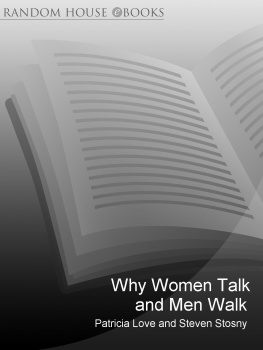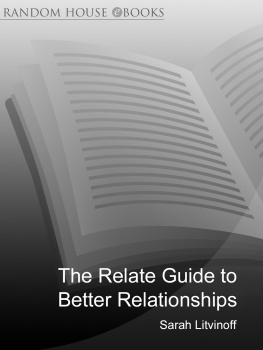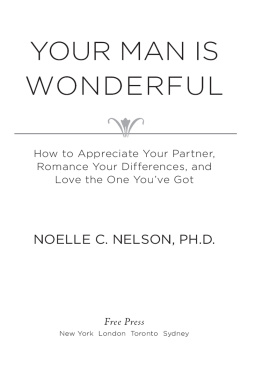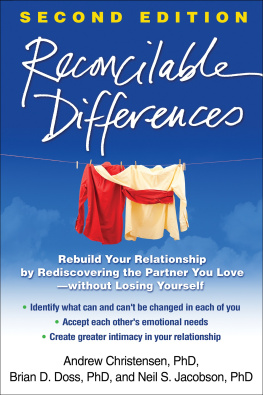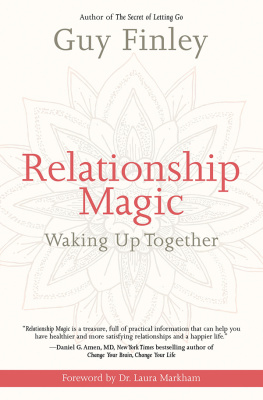Contents
Why Women Talk and Men Walk
How to improve your relationship without discussing it
Patricia Love and Steven Stosny

acknowledgments
To Kathleen Mcfadden, whose third eye, dogged demand for clarity, and enormous writing talent were a vital part of this book, special thanks for the endless hours she spent slogging through every word of every page. To Kris Puopolookay, this is where I get emotional, because writing has been the single scariest thing Ive ever done. Her support, encouragement, and enthusiasm have given me the courage to continue to write despite the fact that I am only an author, not a writer. Not only that, she took a manuscript that was fifty-five thousand words too long and made it into a book without losing one important fact. Her editing made this the juicy, polished product that it is. To Jim Levine, who has been my fantasy agent, gratitude for the enormous amount of personal time and energy he put into every single aspect of this book. To Suzie Bolotin, for giving us the title of this book. And finally, because this book was due right about the time Hurricane Katrina hit and, it just so happened, at the same time an emotional hurricane hit my life, I want to thank the friends who held me up during the period my world was falling down.
Pat Love
I can only double every bit of gratitude Pat expressed for Kathleen, Kris, Jim, and Suzie. Producing this book was an exhilarating experience because of them. As always, my ultimate inspiration came from my mother, Barbara McCrocklin, and from Christine and Carmen, who made me believe, in different ways, that I could be a good person. I am also grateful to the thousands of clients who have inspired me with their courage and their willingness to change old habits that obscured the compassionate people they were. I owe a special thanks to Stephanie, for emotional support during the difficult stages of writing. And finally, I am grateful to the many pets I have had, who made me curious to investigate ethological research on the emotions of social animals, which are important in understanding our own. They were and are great companions, too.
Steven Stosny
authors note
The studies that support this book, like all research, are about group averages, not individuals. The gender studies tell us a lot about groups of men and women but not necessarily that much about any individual man or woman. To appreciate the difference between groups and individuals in gender research, you have only to consider the issue of height. On average, men are taller than women; yet many women are taller than many men. The statement Men are taller than women means that if you take a random sample of around twenty-five men and women, the average height of the males will exceed the average height of the females, although there will be some short men and some tall women in the sample. This book discusses differences between men and women in the subtle ways we cope with shame and fear, allowing that there are many individual exceptions to the truths that apply to either group. We do not wish to fit any individual man or woman into one emotional category or another. We hope to shed new light on some important problems that affect most relationships and to offer a formula for overcoming those problems.
No Social Policy, Equity, Intelligence, or Aptitude Implications!
We absolutely do not believe that anything in this book has social policy implications about things like equal pay for equal work or equality of intelligence, aptitude, or opportunity. Our fervent belief is that men and women are endowed equally with intellectual gifts and aptitudes, and are equally entitled to respect and value. We just as fervently hope that the insights in this book will help us respect and value one another with greater appreciation of our individuality and connectedness, and of how we are alike, how we are different, and how we need to feel part of one another.
introduction
Its Not About Communication
LETS BEGIN BY asking a question of our women readers. If you were to say to the man in your life, Honey, we need to talk about our relationship, what do you think would happen?
If he would answer this question with something like I thought youd never ask! or Ive been dying to share my feelings about our life together, and I especially want to hear how you feel about us and what you want for us, then neither of you needs to read this book. Most women would expect their men would get distracted, defensive, irritated, or fidgety, or roll their eyes or shut down completely; and most men would feel like they were being punished for a crime they didnt commit. Undoubtedly youve had the conversations we are talking about. She knows her lines, he knows his, and it always ends up worse than it started. No wonder the five words a man dreads most are Honey, we need to talk.
We make it a point to ask the women in our workshops and therapy how making men talk about the relationship has worked in the past. Most say something like It didnt work, because he cant communicate. He gets angry, defensive, or impatient. Hes just not interested. Well, it turns out that when it comes to talking about the relationship, men know something that most women dont. Research and our combined fifty-plus years of clinical experience show repeatedly that, despite your best intentions, talking about your relationship has more of a chance of making it worse than making it better. And it has nothing to do with your partners lack of interest or poor communication skills.
Women want to talk about the relationship because theyre upset and want to feel better. Men dont want to talk because talking wont make them feel better. In fact, it will make them feel worse! So whether she forces him to talk or not, they both end up feeling disappointed and disconnected. This loneliness of disconnection lies at the heart of every argument or cold silence, fueling your disappointment or resentment. It also leads to the distance that can ultimately tear your relationship apart.
We believe the chronic stress of disconnection, which eventually afflicts most unions between men and women, stems from a slight difference in the way the sexes experience fear and shame, a difference that is observable shortly after birth. This subtle difference is inherent in the question Do we talk about the relationship or not? The real reason the woman wants to talk about itbeneath the resentment and frustrationis that disconnection makes her feel anxious and, on a deeper level, isolated and afraid. The real reason the man doesnt want to talk about the relationship is that her dissatisfaction with him makes him feel like a failure. On a deeper level, he feels ashamed. His shame is too great to allow him to understand her fear, and her fear keeps her from seeing his shame. When they try to alleviate their feelings of vulnerability in opposite waysby talking and not talkingall they end up sharing are disappointment and heartache.
Your relationship can fail with neither of you doing anything wrong, if you do not understand the extent to which fear and shame drive your disconnection from each other. Understanding each others core vulnerabilities and learning how to manage them will give you a new perspective on your relationshipa dual perspective based on both points of viewthat leads to compassionate connection and love beyond words. Part I of this book will show how fear and shame have kept you both from getting what you most want out of your lives together. Part II will show you how to use your fear and shame to love each other more deeply than ever before, without asking your partner to make even
Next page
